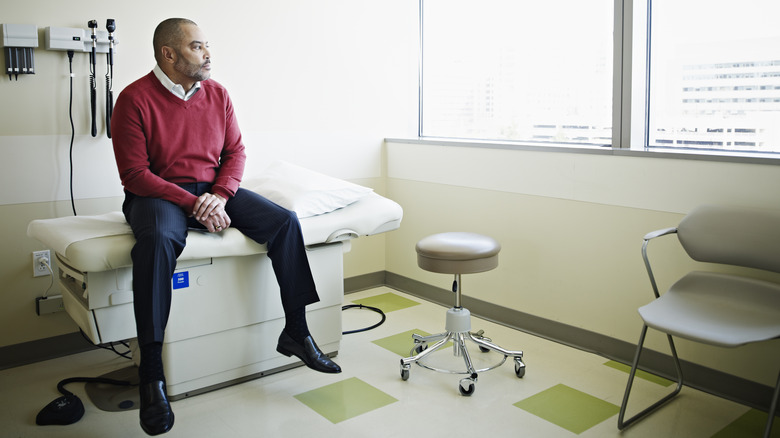
Warning Signs Your Bloated Stomach Is Actually A Prostate Problem – Health Digest
When it comes to prostate cancer, the symptoms are either extra subtle or not what you might expect. For example, back pain, as well as pale skin can be warning signs that you just might have prostate cancer. Another unexpected physical issue that could arise as your body tries to give you a heads up that you have prostate cancer is, of all things, a bloated stomach.
“Abdominal bloating from prostate issues occurs due to the location of the prostate (a small gland just below the bladder in males),” founding physician at Misra Wellness Dr. Sulagna Misra, MD, BCMAS exclusively tells Health Digest. “When inflamed due to any reason, prostatitis (“itis” meaning “inflammation of” not due to an attributed specific cause), or prostate inflammation, can cause local nerve endings to be disrupted and affected, which can cause irritable or a change in bowel movements.” Because of this shift, symptoms like lower stomach pain and abominable bloating can follow. According to Dr. Misra, even Lower Urinary Tract Syndrome (LUTS) can be a sign of prostate cancer.
If you have a prostate and you’ve noticed that your abdomen is more bloated than usual — and it’s not just because you feasted on one of those “hungry man” breakfasts that almost every diner serves — you definitely want to contact your doctor. It could be absolutely nothing, or absolutely something.
Other possible prostate cancer symptoms that might accompany a bloated stomach
What can be confusing about having a bloated stomach is that it can be indicative of more than one thing. Sure, it’s among the prostate cancer warning signs, but it’s also a symptom of prostatitis. In either case, a bloated stomach is very likely not the only issue you’re experiencing.
“Generally, acute prostatitis can be terrible,” says Dr. Sulagna Misra. “Men are generally acutely ill, with flu like symptoms of fever, chills, body aches, testicular pain, pain at the tip of the penis, pain while urinating or abnormal urine, including cloudy or blood in urine, difficulty urinating or excessive urination, perineal pain, lower abdominal pain/lower uterine pain, and more.” In other words, if you’ve reached the point in an illness where your stomach extends past its normal parameters, so to speak, it’s not going to be the only problem from which you’re suffering. But, as Dr. Misra points out, as much as these symptoms suggest possible prostatitis, they can also exist because of prostate cancer — if that prostate cancer has evolved into the severe territory.
Since prostate cancer is screened for, men may think that these symptoms are due to age, explains Dr. Misra. However, that may not be the case. “Prostate cancer can vary from very rapidly growing to slow growing,” says Dr. Misra. Basically, you never really know what’s going on or why your body is behaving the way it is until you talk to a healthcare professional.
When to see a doctor for your bloated stomach
The best time to see a doctor about your bloated stomach? “Anytime!” exclaims Dr. Sulagna Misra. Because a bloated stomach isn’t likely to present itself without other issues, there’s a good chance you’ll be in some form of discomfort. If that’s the case, then there’s no point in delaying a trip to the doctor’s office.
“We are all largely dismissive about bloating and associated symptoms and often attribute bloating issues with aging and difficulty digesting, but bloating can signify many things being wrong, from ovarian cancer in women to being the only symptom of prostate issues in men,” says Dr. Misra. Although the aging body really gets put through the wringer, whenever anything arises that’s unfamiliar and new to you, you want to tell your doctor. As Dr. Misra points out, good communication between patients and their doctors is paramount.
If your bloated stomach includes blood in the urine or semen, rapid and unexplained weight loss, or incontinence, Dr. Misra categorizes these symptoms as alarming and something that should be addressed immediately. In fact, she advises you might want to skip the doctor’s office and go directly to the emergency room for evaluation.





